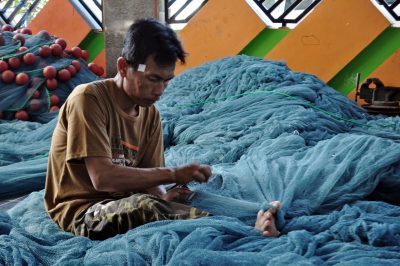Managing, retrieving, and recycling fishing gear and inventorying plastic use and loss from aquaculture in Indonesia
Oct 09, 2020
The Government of Indonesia, supported by the World Bank, is currently undertaking efforts to strengthen the capacity of government institutions, the private sector, and local fishing communities to increase sustainable social and economic benefits from Indonesia’s fisheries.
To support the project, a pre-feasibility assessment is required on the management, retrieval, and recycling of used and abandoned, lost, and discarded fishing gear (ALDFG) and an inventory of plastic use and loss in the aquaculture sector. ALDFG and plastic waste can cause substantial ecologic and socio-economic problems. For example, in ghost fishing, fish and other marine organisms continue to get trapped and die in the gear or ingest plastic particles. The biggest issues to be addressed in the study include:
- the lack of data on the amounts of ALDFG in the seas and their precise locations
- the expansive sea areas of each province and limited information on fishing ground characterization that make ALDFG estimates prone to error
- the recognition that fishing and aquaculture gear retrieval, reuse, and recycling is a problem that will span multiple decades and solutions must be aligned accordingly
- the need for Indonesian-led, sea-based research and development to tailor mitigation measures for remote local communities, which will require significant financial and HR investments
PT Hatfield Indonesia is collaborating with Poseidon Aquatic Resource Management Ltd. to support baseline data collection for a pre-feasibility assessment for a used and ghost gear repair, retrieval, and recycling value chain.
